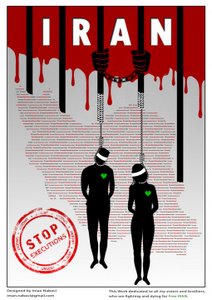 AI, — Countries which continue to use the death penalty are being left increasingly isolated following a decade of progress towards abolition, Amnesty International has said today in its new report Death Sentences and Executions in 2010.
AI, — Countries which continue to use the death penalty are being left increasingly isolated following a decade of progress towards abolition, Amnesty International has said today in its new report Death Sentences and Executions in 2010.
A total of 31 countries abolished the death penalty in law or in practice during the last 10 years but China, Iran, Saudi Arabia, the USA and Yemen remain amongst the most frequent executioners, some in direct contradiction of international human rights law.
Amnesty pointed out the appalling repression of the Kurdish people in Iran. At the end of 2010, at least 17 Kurds, including one woman – Zeynab Jalalian – were on death row following their conviction for alleged political offences. All were convicted after unfair trials for moharebeh (enmity with God), for membership in banned Kurdish opposition groups.
Some were reported to have been tortured in detention and to have been denied access to a lawyer. One of them, Hossein Khezri, was feared to have been executed on 15 January 2011, while the execution of another, Habibollah Latifi, scheduled for 26 December 2010, was postponed after international and domestic appeals.
The total number of executions officially recorded by Amnesty International in 2010 went down from at least 714 people in 2009 to at least 527 in 2010, excluding China.
China is believed to have executed thousands in 2010 but continues to maintain its secrecy over its use of the death penalty. “The minority of states that continue to systematically use the death penalty were responsible for thousands of executions in 2010, defying the global anti-death penalty trend,” said Salil Shetty, Amnesty International’s Secretary General.
“While executions may be on the decline, a number of countries continue to pass death sentences for drug-related offences, economic crimes, sexual relations between consenting adults and blasphemy, violating international human rights law forbidding the use of the death penalty except for the most serious crimes,” said Salil Shetty.
Two regions are responsible for most executions worldwide: Asia and the Middle East. China used the death penalty in 2010 against thousands of people for a wide range of crimes that include non-violent offences and after proceedings that did not meet international fair trial standards.
A significant proportion of the executions or death sentences recorded in 2010 in China, Egypt, Indonesia, Iran, Laos, Libya, Malaysia, Thailand, United Arab Emirates, Saudi Arabia and Yemen were for drug-related offences.
Iran, Pakistan, Saudi Arabia, Sudan, and the United Arab Emirates ignored international prohibitions in 2010 and imposed death sentences on individuals that were below 18 years of age when the crimes were committed.
Amnesty International’s report highlights a number of setbacks during 2010 when six other countries and territories carried out executions after a hiatus and one country expanded the scope of the death penalty.